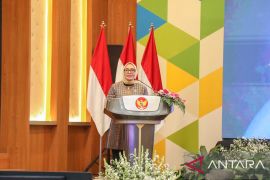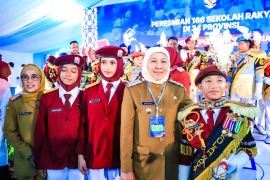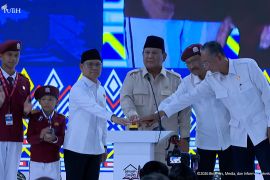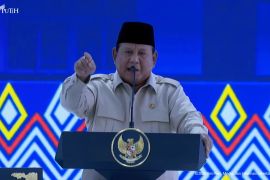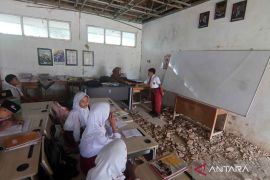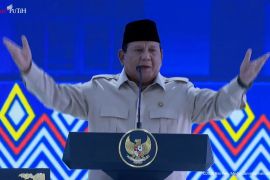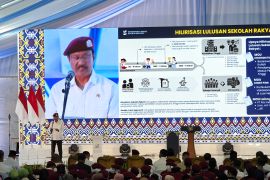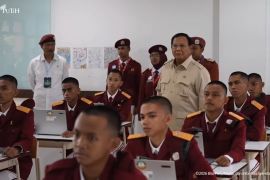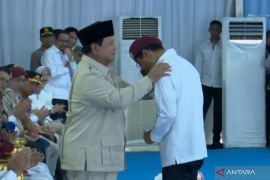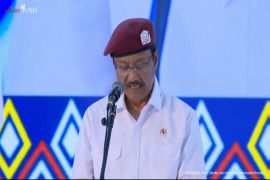Amid the clinking of coffee cups and hushed conversations among fellow prospective school principals, the 45-year-old tried to steady his breath —a mix of exhaustion and nerves— after five days of military-style leadership and management training.
Franklin had traveled from the far remote areas of Papua, not merely to submit application documents but to pursue a mission to ensure that poverty is no longer a reason for children in remote areas to miss out on education and to fulfill their dreams.
For him, the solution lies in the new free school program for underprivileged children, Sekolah Rakyat (People's School).
Franklin already held a secure position as principal of the public high school SMA Negeri Samber, a school he founded and managed in Yendidori Village, Biak Numfor District, Papua.
However, Sekolah Rakyat —a free boarding school for children from impoverished and extremely poor families— called to him.
“If I wanted to play it safe, I could have stayed in my post at SMA Samber, but this is a chance to be an extension of the government’s hands to help people who need it the most,” Franklin stated firmly.
That decision was not made overnight. Growing up where the sea breeze meets wooden boats and the traditional Wor songs echo through the morning air, Franklin has long witnessed eager children stop attending school because they could not afford uniforms, boat fares to go to school, or even lunch.
Those memories stayed with him and eventually led him down this new path in Sekolah Rakyat.
Franklin’s journey to becoming a Sekolah Rakyat principal was not easy. He recalled that the selection process was more rigorous than expected, including an interview with the Ministry of Social Affairs, followed by psychological assessments and TOEFL tests.
“For those of us teaching in remote areas, these tests were quite a challenge,” he admitted with a smile.
Out of hundreds of applicants, Franklin was selected as one of the first 100 Sekolah Rakyat principals, alongside 47 others who had just completed the second retreat phase.
The five-day retreat became a space for reflection. In air-conditioned rooms unfamiliar to him, Franklin took notes on leadership, school management, and discipline during sessions with military personnel.
“They taught us with a gentle touch, but the lessons ran deep,” he remarked.
He understands that leading Sekolah Rakyat is not just about managing schedules or administrative work but about becoming a role model, a listener, and a motivator for the students who will study there.
“Like entering a forest without a map, I do not know what the trail looks like yet, but my determination is clear,” he affirmed.
Determination despite uncertainties
Social Affairs Minister Saifullah Yusuf acknowledged that some candidates had withdrawn, either due to uncertainty over official appointments or the remote locations of the schools. However, he stressed that interest in becoming educational personnel in the Sekolah Rakyat program remained high.
“We still have many reserves. The program is not short on resources,” he added.
Despite this reassurance, Franklin remained unsure who would join him as teachers in Biak Numfor. “I checked the list of names and could not find any names from Papua,” he revealed.
Gina Intana Dewi from South Tangerang and Janet Berotabui from Jayapura also expressed concern over not yet knowing who their teachers would be, even as the new academic year was about to start.
For Franklin, such uncertainty is all too familiar in eastern Indonesia. He believes the delay in teacher recruitment in Papua likely led to fewer applications, and eventually, none were selected.
What he does know is that the Sekolah Rakyat school building in Biak Numfor is ready, where he will serve as principal. He has not visited the site but already imagines simple classrooms, dormitory beds, and students waking up early to study.
“All the children need to do is show up and learn,” he said warmly.
According to the Ministry of Social Affairs, the first wave of Sekolah Rakyat will accommodate 9,755 students, supported by 1,554 teachers and nearly four thousand education staff. Orientation begins on July 14, 2025, and all students will live at the boarding school.
Minister Yusuf attributed the program’s quick rollout to cooperation across ministries, local governments, and the spirit of educators like Franklin.
Franklin is well aware of the real challenges that remain, such as building renovations, incomplete student data, and uncertain teacher appointments, but he chooses to focus on welcoming the children who will arrive with dreams from humble homes in Biak Numfor.
“I do not know their names yet, but they are already in my prayers,” he remarked.
By the coral shores and as the fishermen’s boats return at dawn, Franklin waits for Sekolah Rakyat’s first day.
He may not yet know the faces of the children, but he believes that the smiles of students proudly wearing their school uniforms will answer why he left the comfort of his old job.
For Franklin, becoming a Sekolah Rakyat principal is more than leading a new school—it is also a vow to his homeland that poverty may take many things, but it must never again steal a child’s dream.
In the often-forgotten east of the country, Franklin has chosen to be the guardian of that promise.
Related news: Indonesia’s Sekolah Rakyat to include street children, says official
Related news: Sekolah Rakyat to have proper kitchens, dorms, Yusuf says
Translator: Prasetyo, Kenzu
Editor: Arie Novarina
Copyright © ANTARA 2025

